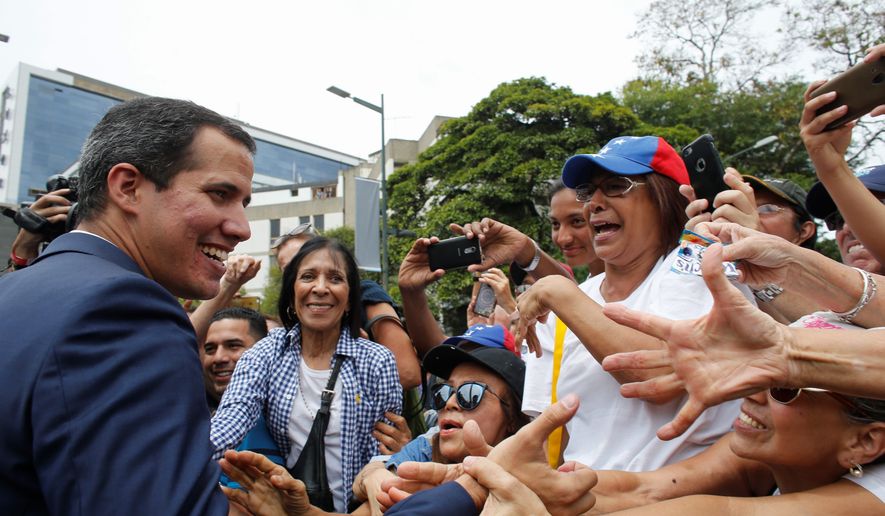The Trump administration is readying a new round of economic sanctions in a bid to squeeze the government of Venezuelan socialist President Nicolas Maduro, President Trump’s point man on the crisis in Caracas said Wednesday.
Special representative to Venezuela Elliott Abrams told the Washington-based think tank Foundation for Defense of Democracies that the sanctions set to be announced Thursday are meant to keep the pressure on the Maduro government, which is locked in a power struggle with opposition leader Juan Guaido — the man Washington and a large number of allies say is Venezuela’s rightful leader.
“We keep rolling out additional sanctions to keep the pressure up,” Mr. Abrams said. “We are trying to cut off the funds flow to the regime, and I think we’re having a fairly dramatic impact on the regime.”
The U.S. government has already sanctioned more than 150 people and entities, revoked visas for some 718 of Mr. Maduro’s associates, and instituted measures that have drastically cut Venezuela’s oil exports, a critical source of revenue for the regime.
But Trump administration hopes earlier this year that the Maduro regime would crack quickly in the face of the uprising by Mr. Guaido have been frustrated. The two sides are engaged in power-sharing talks that have produced little concrete progress to date.
But Mr. Abrams said Wednesday that time is not on Mr. Maduro’s side.
“I can’t predict how the regime falls, I can’t predict the date,” Mr. Abrams said. “It’s a combination of all these pressures, but I think it’s inevitable.”
Moises Rendon, director for The Future of Venezuela Initiative at the Center for Strategic and International Studies, said the main impact of the U.S. and international sanctions has been to force Mr. Maduro to the bargaining table.
The sanctions, Mr. Rendon said, give Mr. Guaido leverage because they not only cause harm to Mr. Maduro, but also his family and inner circle.
“Are sanctions enough? No,” Mr. Rendon said. “But are sanctions helpful to get Maduro to think twice about his activities? Yes.”
The European Union is also preparing new sanctions against Venezuela.
“In case there are no concrete results from the ongoing negotiations, the EU will further expand its targeted measures,” EU foreign policy chief Federica Mogherini said in a statement.
Mediated by Norway, talks between Mr. Maduro’s government and the opposition are ongoing with the latest talks taking place in Barbados.
Carlos Vecchio, Mr. Guaido’s diplomatic representative in Washington, said more international pressure on Mr. Maduro is vital if the talks are to succeed. One of the sticking points in the talks is how to organize new, honest elections while the regime retains control of the courts, the press, police and security forces, Mr. Rendon said.
“Yes, we can have international observers. The Maduro regime can lift all the bans from the political leaders to run as candidates, but is that enough? I don’t think that’s enough,” Mr. Rendon said.
Mr. Abrams said it is “not sensible” to expect free and fair elections in Venezuela while Mr. Maduro remains in power.
Over 50 nations recognize Mr. Guaido as the rightful leader of Venezuela, claiming Mr. Maduro’s 2018 reelection campaign was riddled with fraud. Peru is hosting 100 countries for a meeting on the political unrest in Venezuela on August 6.
As the U.S. rallies international support against Mr. Maduro, Mr. Abrams warned that any move by the government against Mr. Guaido personally would cross a “red line.”
“Dozens of countries, I think, have made it clear that they will change their behavior with respect to this regime if they arrest or detain or harm President Guaido,” he said.




Please read our comment policy before commenting.